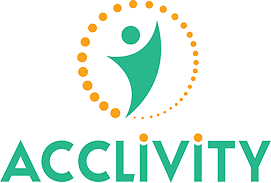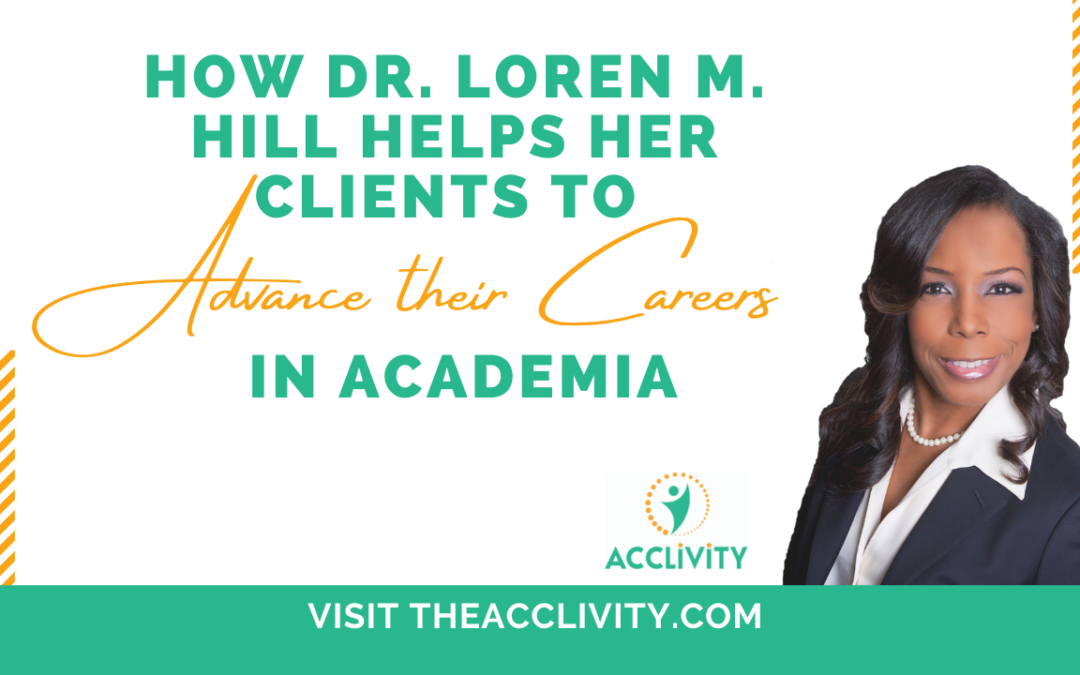For further information on Academic Career Advancements support and coaching book a free no-obligation chat with Dr. Loren M Hill at https://theacclivity.com/Consultation.
Hi, this is Mark Canty with Release Dynamics and I’m here today with Dr. Loren M. Hill of The Acclivity, and you can learn more about Dr. Hill at www.TheAcclivity.com, that’s Acclivity with two C’s by the way. So what I want to do today was just get to know a little bit more about Dr. Hill. So Dr. Hill would you please share with us a little about your background? What has brought you to the point that you are today? Give us a little of your personal history.
Hi Mark, it’s so good to be joining you today. I feel like we’re old friends! We’ve had a few conversations and I think this conversation was brought about because you were, like, wait let’s find out more about you… how did you get here, right? And the way I ended up getting to being an academic career coach was that I spent 20 plus years in academia and during that time I had held just about every position. I started off as an adjunct professor. One of my coaches/mentors recommended that I join academia and do some adjunct teaching and at the time I really hadn’t considered it much. I had a job in mental health and thought who has time for this? But because she knew me from my graduate studies, she said you’d be great at this, and I think you would enjoy teaching. I think you would enjoy engaging with young minds. Being able to put together syllabi, have dynamic critical engagement, and the more she talked to me about it, I thought you know what, this is a good idea, let me try it out. And so I applied, I was hired, it was great and it helped that the person who was hiring me was actually my former mentor. So sometimes it’s who you know right? And yes, see things in you that you may not see in yourself. So that started my adjunct career.
Then I later went into academia full time. I was offered a position, I wasn’t really looking for a position and I liked it. Then I decided, wow if I’m going to be here, I should probably try to figure out how to promote in rank. I did that. It was not so easy either. People kind of knew about promotions, they weren’t really sure some people had promoted it. It was quite a maze and I ended up navigating that maze with some support from some senior faculty and decided that I would help some other folks along the way, some peer faculty members and they appreciated that. I then ultimately became department chair and then was hiring people, writing letters of recommendations and it was quite a journey.
It was not always easy. There were some highs and some lows and there were some times that I felt isolated. I felt lonely. I felt like I wanted to quit and I thought, you know, this probably isn’t going to be good for me. I felt like I was unhealthy, stressed, you name it. But again, there were times when I felt rewarded, when I was engaging with the students, when my Dean and my institutional President gave me several awards and accommodations. And so it was quite the journey through academia and that’s just a small piece of it.
But on the other side of it, I had a colleague who’s pointed out to me, you know what Loren? You’re always helping people either get a job, you’re mentoring the students, you’re helping people promote, you’re going around literally poking at people saying… you need to promote, you need to promote and I can help you! And she said, why don’t you start doing that as a coach and I thought, really??? And she said, absolutely! You’re great at this and there’s nobody out there doing it. You should do it and I bet you people would line up to work with you. And you know what? She was right! So that’s how I ended up being an academic career coach.
Wow that’s, that’s fantastic! I love the way you describe that. I mean, first of all, we’ve talked about this before. What’s really cool is when you can connect with a coach who’s been there and done that. So you know it’s interesting that in academia we often criticize people in the academy because they haven’t got real-world experience, but here you are. You know, exemplifying somebody who’s walked the talk, gone on that path, taken that journey, gone through all the trials and tribulations… what people can really learn, from that. I am curious about something else though, because I know in our conversations that being an academic career coach is not your sole focus. You’re a very busy woman and you’ve got your fingers in a lot of other things, so I’d love to know more about some of that part of your history and where the Ph.D. comes from. So tell us, what else you’re up to when you’re not coaching people on advancing their careers and in academia?
Mark, you found me out! Yes, I do have a Ph.D. in clinical psychology. I have a thriving practice in neurodevelopmental psychology. So in my private practice, I focus on assessment and testing and diagnostics for people and children who have speech and language delay, autism, developmental delays… anything that we would see generally from birth to age maybe five or ten. Sometimes we see, that a little later in life, we have people who’ve been undiagnosed and so I specialize in that so that’s one part of my life and the interesting thing is the coaching sort of, in an unusual way, intersects, right? So I’m in my private practice, I’m always looking to put the puzzle pieces together for a diagnostic? It’s either this or that or something’s missing or how do we figure this out? We’ve got this person who’s presenting a certain way and how do we figure it out and help that be presented to someone else? Right?
So in coaching, in my academic career coaching, I’ve got this person who comes to me, who has these pieces of themselves, who we work together to make this puzzle and present to the world of academia, as you know, you’re a good fit for this or you are a good fit for this but maybe not this institution. Or you’re a good fit for this but maybe not that job, or have you thought about going into administration?
And here’s another thing Mark, there are people who like me, were in academia and they’re thinking about how do I transition out? I have clients who have done very well in academia but they have these other skill sets and they want to apply them. They’re not sure if they want to transition out completely or if they want to split their time like I did. For a good portion of my career in academia I had my business in psychology and I also was at academician and so how do you navigate that or how you balance that or how you strategize on how to exit. So some of the folks that I work with, we’re strategizing on how to enter and then other folks I’m strategizing about how to exit.
Wow another mind-blowing combination of things and really exciting to think that, you know, when working with you. If I were to work with you, I’m not just getting a career coach, I’m getting a clinical psychologist. I mean that’s crazy! But I love the way you transfer those skills and your comment about diagnosis and that’s something that we all need. You know we’ve got a lot of stuff going on. Our whole engine is working whether it’s in our career or our brains or our bodies and diagnosis is the first step to getting us moving to where we want to be. Whether it’s a healthier body, a healthier mind or a healthier career, that’s appropriate for us, so I love how you tie all that together that’s fantastic.
Thank you so much for spending time with me today and for sharing with the world what you’re up to and what’s happening, and if somebody wants to talk with you, if they’d like to have a chat with you and explore more in more detail what you do and what you might be able to do for them, how would they go about getting in touch with you? How could they connect with you?
The way someone would connect with me is really simple just go to my website TheAcclivity.com. So that’s Acclivity with two C’s. When you get to the web page you’ll see an orange button that says let’s talk. Just click on that, it takes you straight to my calendar. Find a time that’s convenient, book and the consultation is free. Now we will use the word consultation because that’s what it is but I want to tie it back to something we were just talking about… the diagnosis, right? So as we all know, the way you get to a diagnosis is through an assessment right? So this consultation will be an assessment…is this a good fit? Are you right on point? Do you need just some directions? What’s going on? So we need to be able to assess and the assessment is done through the consultation and so I look forward to people booking those consultations and let’s do the assessment.
Thanks so much, Dr. Hill. It’s been a pleasure being with you. I really appreciate you sharing so much about yourself and your background. It’s really helpful, I know, for a lot of people who are looking for help and they want to know a little bit more about people who could possibly help them. So thanks so much for being that resource for them and I will look forward to hopefully another time that we can talk and address another topic that people might be looking at in this whole arena of advancing in academia and instruction and teaching. We’ve talked about becoming an adjunct professor and we’ll talk about other things I’m sure in the future so I’m looking forward to that. Thank you so much for being with us once again.
Thank you Mark. I’m looking forward to speaking with you again soon.
For further information on Academic Career Advancements support and coaching book a free no-obligation chat with Dr. Loren M Hill at https://theacclivity.com/Consultation.

